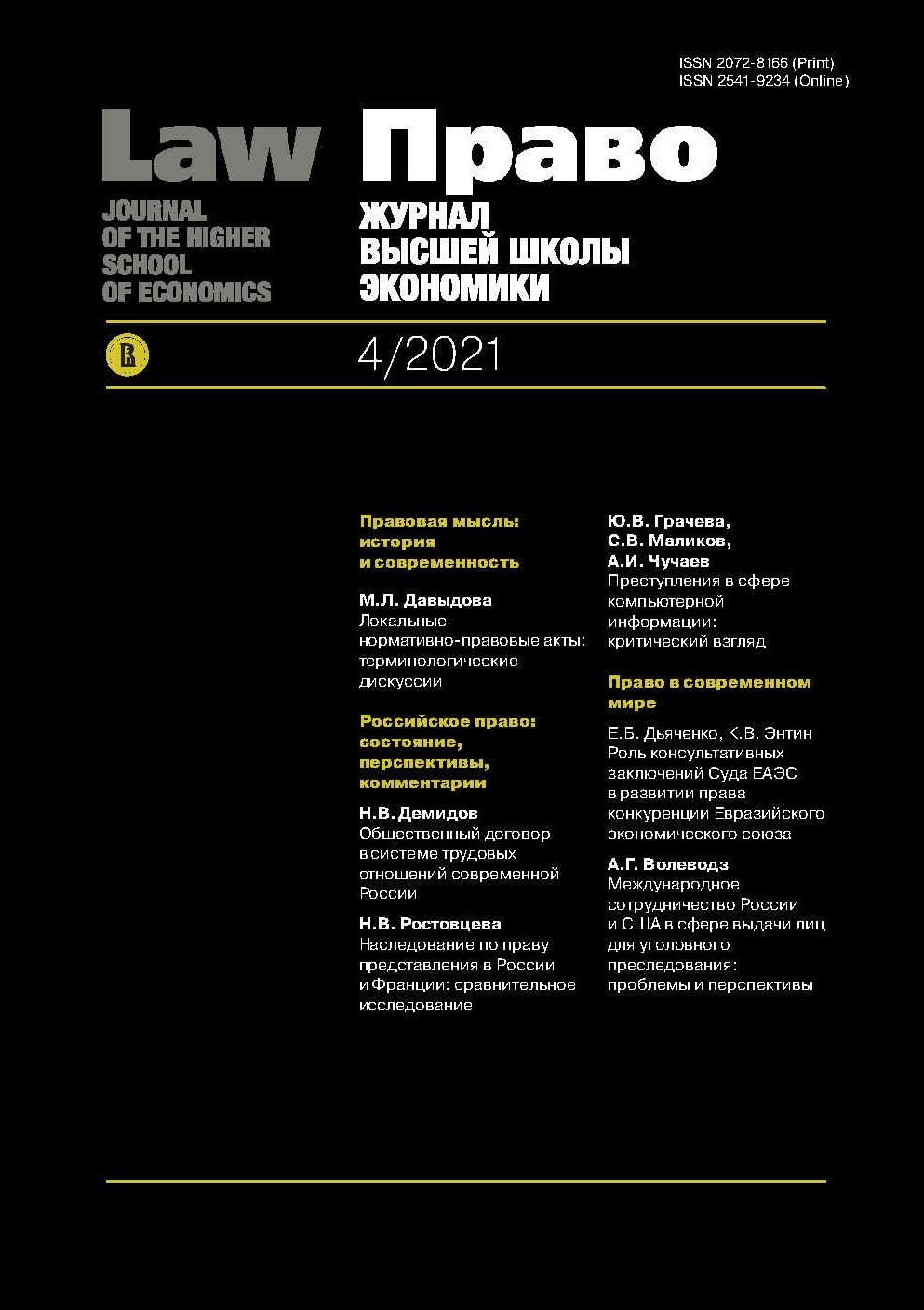The Role of the EAEU Court's Advisory Opinions in Development of the Eurasian Economic Union's Competition Law
Abstract
The present article analyses the general principles and rules of competition stipulated in the Treaty on the Eurasian Economic Union in the light of the EAEU Court case law. The authors review the types of policies implemented within the EAEU, explain the difference between the general principles and rules of competition and emphasize the practical importance of the Court’s conclusion on the direct effect and direct applicability of the general rules of competition. A significant part of the article is devoted to issues addressed in the Court’s case law on the interaction between EAEU competition law and the antitrust legislation of the member states, as well as to the competence delimitation between the Eurasian Economic Commission and the national competition authorities. According to the authors, despite the fact that the provisions of the Treaty are aimed at excluding cases in which investigation is to be carried out by national authorities and the Commission simultaneously, the novelty of regulation and the complexity of the transboundary markets criteria made it necessary for the Court to foresee a scenario where parallel investigations will not be terminated and will result in decisions by both bodies. The solution to the problem was found in the entrenchment of the ne bis in idem principle in the advisory opinion of 18 June 2019. In terms of distribution of powers between supranational and national levels of legal regulation, the Court’s opinion on restraint of prohibited coordination of economic activities, stipulated in the advisory opinion of 17 December 2018, merits consideration. The Commission shall have competence to deal with this violation when the coordination of economic activities has an adverse effect on competition on a transboundary market. In the context of the substantive matters study, the authors take a close look at the position of the Court, set out in the Advisory opinion of 4 April 2017, related to the right of the member states to establish additional criteria for admissibility of “vertical” agreements in national legislation. Taking into account the influence of the law of the European Union on the development of EAEU competition law the authors undertake a comparative analysis of the EAEU Court’s advisory opinions with the case law of the Court of Justice of the EU, underlining the main similarities and differences.
References
Belikova K.M., Gabov A.V., Gavrilov D.A. (2015) Coordinating economic activity in Russian legal space. SPS Konsul'tant Plus. (In Russ.).
Bodnar A. (2014) Res Interpretata: Legal Effect of the European Court of Human Rights' Judgments for States Were not Party to the Proceedings. In: Haeck Y., Brems E. (eds.) Human Rights and Civil Liberties in the 21st Century. Comparative Perspectives on Law and Justice. Dordrecht: Springer, pp. 223-262.
Bronckers M., Vallery A. (2011) No Longer Presumed Guilty: The Impact of Fundamental Rights on Certain Dogmas of EU Competition Law. World Competition: Law and Economics Review, vol. 34, no. 4, pp. 535-570.
Dworkin R. (1977) Taking rights seriously. Cambridge: Harvard University Press, 371 p.
Ispolinov A.S. (2018) Dissenting opinions in international courts: doctrine and practice. Pravo. Zhurnal Vysshey shkoly ekonomiki = Law Journal of Higher School of Economics, no. 1, pp. 218-233. (In Russ.).
Libertini M. (2019) Cumulative Enforcement of European and National Competition Law and the Ne Bis in Idem Principle Case Comment to the Judgement of EU Court of Justice of 3 April 2019 (case C-617/17). Yearbook of Antitrust and Regulatory Studies, vol. 19, no. 12, pp. 231-243.
Neshataeva T. N. (2017) The Court of the European Economic Union: from legal position to acting law. Mezhdunarodnoe pravosudie=International Justice, no. 2, pp. 64-79. (In Russ.).
Pisenko K.A. (2018) Administrative law principles of antimonopoly policy in the light of strategic objectives and the balance of interest. In: A.V. Belitskaya et al (eds.) Issues of modern competition law. Moscow: Yustitsinform, pp. 51-64. (In Russ.).
Rosano A. (2011) Ne Bis Interpretatio In Idem? The Two Faces of the Ne Bis In Idem Principle in the Case Law of the European Court of Justice. German Law Journal, vol. 18, no. 1, pp. 39-58.
Seregin D.I. (2019) Re the concept of transborder market of goods. In: Issues of modern competition law. Moscow: Yustitsinform, pp. 63-70. (In Russ.).
Semmelmann C. (2013) General Principles in EU Law between a Compensatory Role and an Intrinsic Value: General Principles of EU Law. European Law Journal, vol. 19, no. 4, pp. 457-487.
Sokolov A. Yu., Dekhtyar' I.N. (2019) On the powers of the ECE concerning the breaches of antimonopoly legislation. Administrativnoe pravo i process = Administrative Law and Process, no. 7, pp. 61-64. (In Russ.).
Talbot C. (2016) AC-Treuhand, the Scope of Article 101 TFEU, and the Future of Actions for Antitrust Damages. Commercial Law Practitioner, pp. 9-14.
Tridimas T. (2006) The General Principles of EU Law. Oxford: OUP, 720 p.
Van Bockel B. (2010) The Ne Bis in Idem Principle in EU Law. Alphen an den Rijn: Wolters Kluwer, 267 p.
Copyright (c) 2021 Law Journal of the Higher School of Economics

This work is licensed under a Creative Commons Attribution-ShareAlike 4.0 International License.


















